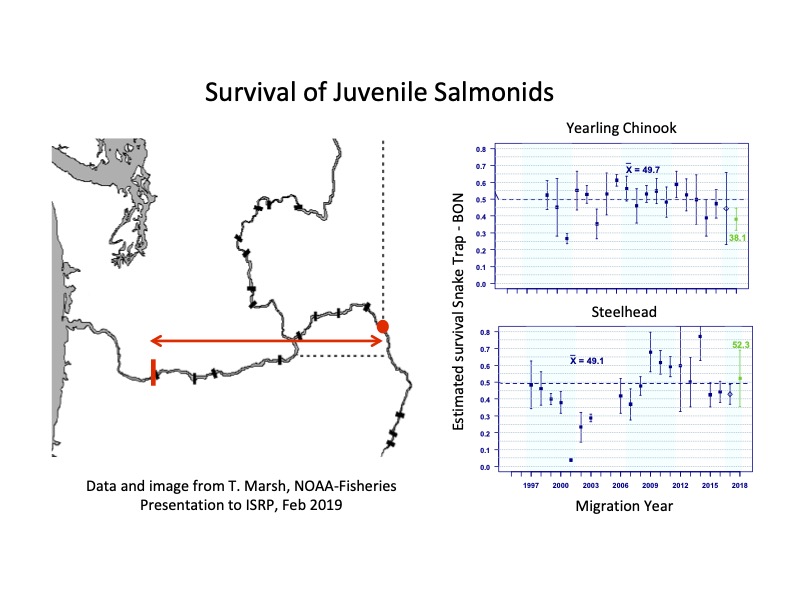forum
library
tutorial
contact

Salmon Face Bigger Threat
Than Snake River's Dams
by David Welch
Everett Herald, August 21, 2022
|
the film forum library tutorial contact |

|
Salmon Face Bigger Threat
by David Welch
|
All Northwest rivers are seeing low returns of salmon.
Blame climate change's effects on the ocean.
 I share the frustration of Herald editorial writers when it comes to salmon and lower Snake River dams, though perhaps in a bit difference sense ("Waiting could force bad choice on dams, salmon," The Herald, July 5). The clock is ticking, and it is obvious what is leading salmon towards extinction; not just Snake River salmon, but chinook salmon all the way north to Alaska: climate change and its effect on the ocean environment.
I share the frustration of Herald editorial writers when it comes to salmon and lower Snake River dams, though perhaps in a bit difference sense ("Waiting could force bad choice on dams, salmon," The Herald, July 5). The clock is ticking, and it is obvious what is leading salmon towards extinction; not just Snake River salmon, but chinook salmon all the way north to Alaska: climate change and its effect on the ocean environment.
Our 2020 study demonstrated that chinook all along the Pacific Coast of North America have seen a 65 percent decline in survival since the 1970s. Snake River salmon are not the exception, but are actually similar in terms of the percent of salmon returning as adults to their native rivers. Viewed from this wider perspective, the presence of dams thus does not appear to be a significant factor, as we see the same survival in free flowing, nearly pristine rivers in Alaska and northern British Columbia.
Despite this, a recent "scientific consensus" report from NOAA Fisheries repeats the unsubstantiated claim that removing the lower Snake River dams will spur recovery of chinook salmon populations.
Put simply, dam breaching is unable to deliver the promised outcome due to basic math. About 50 percent of juvenile Snake River chinook successfully make it past all eight dams on the lower Columbia and lower Snake rivers. This survival rate is about the same as Canada's undammed Fraser River (and other rivers where smolt survival has been measured). Unfortunately, also like the Fraser and these other dam-free rivers, only 1 percent return as adults.
In fact, even if we assume that all dams in the lower Columbia and Snake rivers were removed and that somehow 100 percent of juvenile salmon survive, doubling the number of juvenile salmon would only result in 2 percent adult returns; a number still too small to sustain healthy salmon populations.
The real source of the problem lies in the ocean. But because many freshwater scientists are so convinced the dams must be the problem, they've found a way to still blame the dams. "Delayed mortality" is the concept that the poor ocean survival really is due to juvenile salmon being damaged by the dams and, as a result, survive more poorly at sea. Yet none of these scientists have explained why survival all along the coast is similar (despite the lack of dams in most rivers) and why deliberate experiments to test for delayed mortality found none.
We also found in my 2020 paper that Snake River fall chinook that pass more dams actually return at a higher rate than do populations passing through fewer dams. Do these dams promote survival? Hardly. It just goes to show what happens when true believers pick only the data fitting their beliefs.
The myopic focus of many scientists on the lower Snake River dams is unfortunate because it means fewer resources are available to conduct research in the ocean. At least some NOAA scientists know this is true, because their 2021 peer-reviewed study demonstrated that ocean warming represents a truly existential threat to chinook populations.
It is time to apply best scientific practices and move away from simply hoping that somehow things will all work out if the dams are removed. We have a monumental task ahead of us in fighting climate change. Hydropower is a key piece of the puzzle as we collectively pivot to stop (or at least reduce) global warming, which will help all salmon stocks.
Related Sites:
Review of the Coast-Wide Analysis of Chinook Salmon Smolt to Adult Returns (SARs) by Welch et al. by Independent Science Advisory Board, Northwest Power & Conservation Council, 6/29/21
Related Pages:
ISAB Review of the Coast-Wide Analysis of Chinook Salmon Smolt to Adult Returns (SARs) by Welch et al. by John Harrison, Northwest Power & Conservation Council, 6/29/21
learn more on topics covered in the film
see the video
read the script
learn the songs
discussion forum
